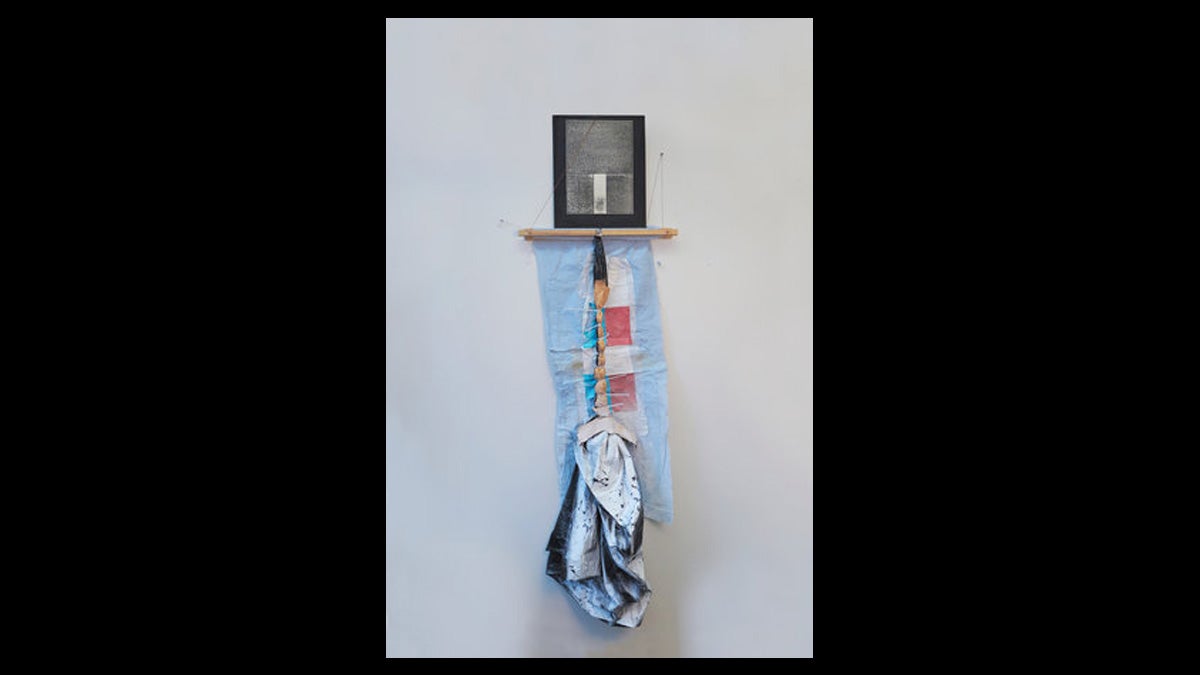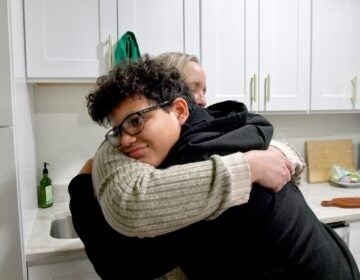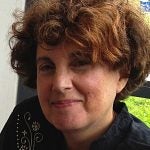Co-founder of the Latin American Community Art Project to speak at Princeton

Looking for Trouble2017
The Salvadoran War lasted 12 horrific years (1979-1992), during which time civilians were terrorized by death squads and children were recruited to be soldiers. More than 75,000 were killed and among the 500,000 who fled the country were the parents of Oscar Rene Carnejo. The artist’s White Flag: Salvadoran Remnants is on view at the Bernstein Gallery, Woodrow Wilson School, Princeton University, through April 7, with a reception Friday, March 10, 6 p.m. Carnejo will give a talk, followed by remarks by former Washington Post award-winning bureau chief for Latin America Charles Krause.
Born in Houston, Texas, in 1982, Carnejo’s woodblock prints and constructions alternate between abstraction and historical realism. The Salvadoran Civil War was what he calls his parents’ war, and yet the second-generation after effects—and being torn between two cultures—is very much his own.
Growing up, Spanish was spoken exclusively in his home and English was spoken in school, but nobody ever talked about why the family left El Salvador. “They were traumatized and wanted to leave it in the past,” he recounts from his home in Brooklyn.
“I didn’t find out it about until I was 19.” After the attacks on September 11, he began asking questions. “I cared for the first time about history and became extremely obsessed about U.S. policy in Latin America.” With access to the NYU archives, “I started seeing images of the living conditions my parents left. It’s pretty outrageous—I’m only one generation removed and I didn’t know about this, and it’s why I’m here.”
Even as his curiosity grew, Carnejo’s parents were reluctant to answer questions, but he persisted and bits and pieces came out. His parents, who had to work since childhood for family sustenance, had to leave school because students were labeled dissidents and insurgents. “They lost their friends and their teachers, until the atmosphere was so polarized they had to leave the country.”
But living in the U.S., “we developed a relationship to labor at a young age—we were all on the same team to make the household run, working with my mom to help her clean houses and then with my dad in construction. We were raising ourselves as my parents worked two to three jobs. It was a constant struggle, staying in school and focusing while taking care of the house and paying bills.”
When Oscar was 12, the family took a trip to his ancestral village, where he saw houses made of mud and straw. It made him realize the privileges he had taken for granted, but he enjoyed being on farms with animals and being with his family in this context. “There was a body language here, a relinking, that I hadn’t experienced in the U.S.”
Encouraged by high school teachers who recognized his artistic gifts, he applied to a pre-college, six-week summer program at the Rhode Island School of Design, earning a scholarship to cover tuition, housing, food and supplies.
His parents did not want him to go. “’Who would give you anything for free?’” they asked. “’How are you going to make a living—you can’t eat the drawings.’ So I had to go against their will.”
The only thing the scholarship didn’t cover was airfare, for which he sold drawings. Once there, “I I knew I wanted to do this for the rest of my life. I hunkered down to focus on developing myself as an artist.” He went to Cooper Union, getting awards and recognition that helped to build his confidence.
One of his mentors at Cooper Union told him that history is made every day. “A building can blow up,” the mentor said. Indeed that day, Sept. 11, a building blew up. “I questioned my role as an artist. It was an existential crisis: How can I be in the studio when these things are going on?” He applied for grants to take his ideas out of the studio and into practice. This included a trip to Mexico in 2004, renovating an abandoned space and co-founding the Latin American Community Art Project, a cultural center where artists could connect to the community through workshops.
With the help of a William Randolph Hearst Scholarship, he returned to the village where his mother grew up and turned her house into a residency for the Latin American Community Art Project, offering free studio space and art classes for the immediate community. This was followed by a Fulbright Scholarship that enabled him to spend a year-and-a-half bringing in international artists to exchange ideas with local artists and set up a print shop.
In 2008, Carnejo returned to the U.S. to attend the MFA program at Yale. His career has included the creation of exhibition-themed workshops at the Contemporary Art Museum in Houston; coordinating the fresco apprentice program at the Skowhegan School in Maine; teaching advanced drawing at Cooper Union; and giving tours of the Studio Museum of Harlem. “If I had my way, I’d still be in El Salvador,” he says.
“I always felt American but discriminated against because I came from another place. Yet recognizing myself as American, I was not welcome when I returned home, where my parents are from. Political refugees are escaping violence at home, or an economic situation where they can’t sustain their family. Now, it’s almost as if what many immigrants were escaping they are facing here. No one wants to leave home and risk their lives. They are doing the work no one here wants to do. If this country wants to stop immigration, pay a fair wage and someone will do the job.”
White Flag: Salvadoran Remnants, artwork by Oscar Rene Cornejo, is on view at the Bernstein Gallery, Woodrow Wilson School, Princeton University, through April 7, with a reception on Friday, March 10, 6 p.m.
_______________________________________________
The Artful Blogger is written by Ilene Dube and offers a look inside the art world of the greater Princeton area. Ilene Dube is an award-winning arts writer and editor, as well as an artist, curator and activist for the arts.
WHYY is your source for fact-based, in-depth journalism and information. As a nonprofit organization, we rely on financial support from readers like you. Please give today.





